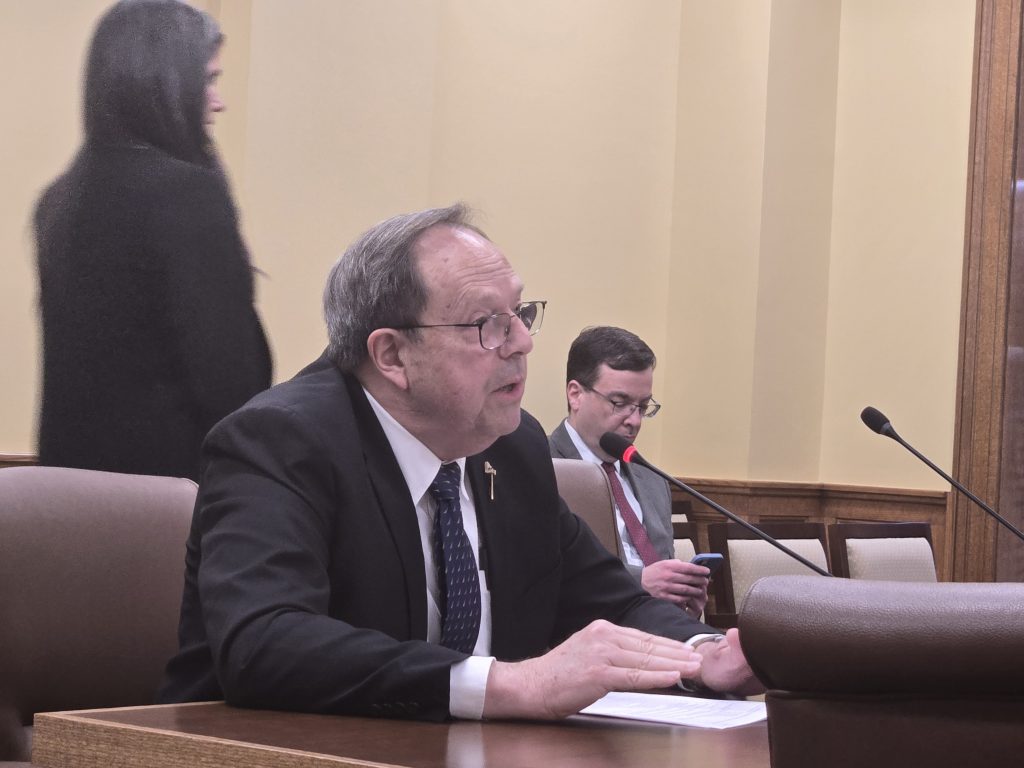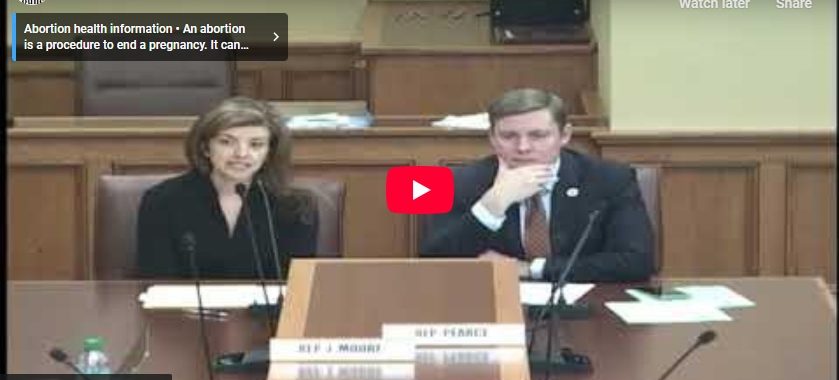From Ballot Initiatives to Drugs, Here’s a Week 9 Recap

The ninth week of the Arkansas Legislature’s 2025 session is drawing to a close.
On Monday, lawmakers filed H.B. 1713 and H.B. 1714 to help clarify state law concerning paid petition canvassers and deceptive ballot measures.
On Tuesday the House Judiciary Committee passed H.B. 1551 clarifying that abortion by fraud is a crime in Arkansas.
On Wednesday the Senate Public Health Committee passed a good bill to clarify Arkansas’ abortion laws.
The House State Agencies Committee passed H.B. 1713 and H.B. 1714 concerning the state’s ballot initiative process.
And the House Rules Committee rejected a bad bill that would legalize drugs made from industrial hemp in Arkansas.
Below is a brief rundown of a few of the bills we are currently tracking.
Good Bills Passed
Act 153 / H.B. 1221 (Ballot Initiatives): This good bill by Rep. David Ray (R — Maumelle) and Sen. Kim Hammer (R — Benton) clarifies Arkansas’ laws concerning initiatives and referenda. The bill makes it clear that petition signatures expire at the end of a General Election cycle. This would prevent canvassers from collecting signatures across multiple election cycles and help ensure sponsors don’t submit old signatures that are outdated or more likely to be invalid. See How Your Representative Voted Here. See How Your Senator Voted Here. Read The Bill Here.
Act 154 / H.B. 1222 (Ballot Initiatives): This good bill by Rep. David Ray (R — Maumelle) and Sen. Kim Hammer (R — Benton) clarifies Arkansas’ laws concerning initiatives and referenda. The bill says the Arkansas Attorney General cannot approve a measure’s sponsors to begin collecting signatures to place a measure on the ballot if the measure conflicts with the U.S. Constitution or federal law. The bill also prevents sponsors from asking the attorney general to certify conflicting measures. See How Your Representative Voted Here. See How Your Senator Voted Here. Read The Bill Here.
Act 218 / S.B. 207 (Ballot Initiatives): This good bill by Sen. Kim Hammer (R — Benton) and Rep. Kendon Underwood (R — Cave Springs) requires petition canvassers to inform people that petition fraud is a crime before obtaining their signatures on a petition. See How Your Senator Voted Here. See How your Representative Voted Here. Read The Bill Here.
Act 240 / S.B. 208 (Ballot Initiatives): This good bill by Sen. Kim Hammer (R — Benton) and Rep. Kendon Underwood (R — Cave Springs) requires canvassers to verify a person’s identity via photo ID before obtaining the person’s signature on a petition. This helps prevent people from fraudulently signing someone else’s name on a petition. See How Your Senator Voted Here. See How Your Representative Voted Here. Read The Bill Here.
Act 273 / S.B. 209 (Ballot Initiatives): This good bill by Sen. Kim Hammer (R — Benton) and Rep. Kendon Underwood (R — Cave Springs) clarifies that the signatures a canvasser collects will not count if the Secretary of State finds the canvasser has violated Arkansas’ laws concerning canvassing, perjury, forgery, or fraud in the process of gathering signatures. See How Your Senator Voted Here. See How Your Representative Voted. Read The Bill Here.
Act 274 / S.B. 210 (Ballot Initiatives): This good bill by Sen. Kim Hammer (R — Benton) and Rep. Kendon Underwood (R — Cave Springs) requires people to read the ballot title of the measure before signing a petition. The ballot title includes a summary of the ballot measure. Reading the ballot title helps ensure people understand the measure before they sign a petition to place the measure on the ballot. See How Your Senator Voted Here. See How Your Representative Voted Here. Read The Bill Here.
Act 241 / S.B. 211 (Ballot Initiatives): This good bill by Sen. Kim Hammer (R — Benton) and Rep. Kendon Underwood (R — Cave Springs) requires petition canvassers to file an affidavit with the Secretary of State verifying that the canvasser complied with the Arkansas Constitution and all Arkansas laws concerning canvassing, perjury, forgery, and fraud in the process of gathering signatures. See How Your Representative Voted Here. See How Your Senator Voted Here. Read The Bill Here.
Act 271 / H.B. 1452 (Marijuana): This good bill by Rep. Robin Lundstrum (R — Elm Springs) and Sen. Tyler Dees (R — Siloam Springs) prohibits marijuana use in public and on Arkansas’ highways. See How Your Representative Voted. See How Your Senator Voted. Read The Bill Here.
Good Bills Filed
H.B. 1610 (Pro-Life): This good bill by Rep. Robin Lundstrum (R — Elm Springs) and Sen. Jimmy Hickey (R — Texarkana) would clarify Arkansas’ law that prohibits abortion except to save the life of the mother in a medical emergency. The bill clarifies the definition of “medical emergency,” strengthens legal protections for doctors who treat pregnant women, closes possible loopholes in the current abortion law, and makes it clear that abortion remains illegal in Arkansas except to save the mother’s life. See How Your Representative Voted Here. Read The Bill Here.
H.B. 1180 (Pro-Life): This good bill by Rep. Mary Bentley (R — Perryville) and Sen. Clint Penzo (R — Springdale) ensures public schools show students a high-definition ultrasound video that is at least three minutes long as part of sex-education and human growth and development education courses. The bill also ensures students see a video like Live Action’s computer-animated “Meet Baby Olivia” video that teaches about human development from conception to birth. See How Your Representative Voted Here. Read The Bill Here.
H.B. 1678 (Pro-Life): This good bill by Rep. Wayne Long (R — Bradford) would strengthen Arkansas’ Abortion-Inducing Drugs Safety Act that prevents abortion drugs from being delivered or administered illegally in Arkansas. The bill would increase the penalty for selling or prescribing illegal abortion-inducing drugs, and it would make it easier to take a person to court for violating the Abortion-Inducing Drugs Safety Act. All of this would provide additional options for enforcing Arkansas’ pro-life laws. Read The Bill Here.
H.B. 1551 (Pro-Life): This good bill by Rep. Jimmy Gazaway (R — Paragould) clarifies that it is a crime to secretly give a pregnant woman abortion-inducing drugs without her knowledge or consent. Read The Bill Here.
H.B. 1202 (Pro-Life): This good bill by the Joint Budget Committee appropriates money for the Department of Finance and Administration for the 2025-2026 fiscal year. The budget includes $2 million in grant funding to pregnancy help organizations that promote maternal and infant wellness and provide material support to women with unplanned pregnancies. Read The Bill Here.
H.B. 1404 (Pro-Life): This good bill by Rep. Cameron Cooper (R — Romance) and Sen. John Payton (R — Wilburn) creates a tax credit for donations to pro-life pregnancy resource centers. Read The Bill Here.
H.B. 1142 (Bioethics): This good bill by Rep. Alyssa Brown (R — Heber Springs) and Sen. Jim Dotson (R — Bentonville) would promote ethical fertility treatments such as restorative reproductive medicine in Arkansas. The bill also protects healthcare providers who have conscientious objections to unethical in vitro fertilization (IVF) and similar procedures. Read The Bill Here.
H.B. 1554 (Bioethics): This good bill by Rep. Alyssa Brown (R — Heber Springs) and Sen. Jim Dotson (R — Bentonville) establishes the Assisted Reproductive Technology Reporting Act in Arkansas. The bill would require fertility clinics to track and report key data related to assisted reproductive technology. H.B. 1554 also would mandate annual reporting on embryo creation, usage, and outcomes, as well as tracking maternal and neonatal health for children conceived through ART. All of this would help the Arkansas Department of Health better track assisted reproductive technology in the state. Read The Bill Here.
S.B. 266 (School Chaplains): This good bill by Sen. Jim Dotson (R — Bentonville) and Rep. Harlan Breaux (R — Holiday Island) clarifies that public schools can adopt policies letting chaplains serve public school students and their families as well as public school employees. The bill does not require public schools to provide chaplain services, but it does clarify that schools are free to adopt policies making chaplain services available if they want. Read The Bill Here.
S.B. 223 (Religious Liberty): This good bill by Sen. Mark Johnson (R — Little Rock) and Rep. Alyssa Brown (R — Heber Springs) affirms public school students’ and teachers’ religious liberties at school. See How Your Senator Voted Here. Read The Bill Here.
H.B. 1139 (Religious Liberty): This good bill by Rep. Brit McKenzie (R — Rogers) and Sen. Joshua Bryant (R — Rogers) would strengthen Arkansas’ law concerning public school “released time.” The bill clarifies that public schools must excuse students from school, if the students’ parents request it, to receive religious instruction off-campus. Read The Bill Here.
H.B. 1574 (Ballot Initiatives): This good bill by Rep. DeAnn Vaught (R — Horatio) and Sen. Kim Hammer (R — Benton) requires petition canvassers for ballot measures to be Arkansas residents who actually live in the state. Read The Bill Here.
S.B. 212 (Ballot Initiatives): This good bill by Sen. Kim Hammer (R — Benton) and Rep. Kendon Underwood (R — Cave Springs) creates the Document Validity Division within the Arkansas Secretary of State’s office to investigate, subpoena, and nullify fraudulent or false documents related to ballot initiatives. Read The Bill Here.
H.B. 1713 (Ballot Initiatives): This good bill by Rep. Ryan Rose (R — Van Buren) and Sen. Mark Johnson (R — Little Rock) requires ballot initiative titles to be written at or below an eighth grade reading level. A ballot title is supposed to accurately summarize a measure so voters can decide if they support or oppose it. H.B. 1713 is similar to legislation enacted in other states to help make sure ballot titles are easy for voters to read and understand. This will help address deceptive or misleading ballot initiatives in Arkansas. Read The Bill Here.
H.B. 1714 (Ballot Initiatives): This good bill by Rep. Ryan Rose (R — Van Buren) and Sen. Kim Hammer (R — Benton) clarifies the definition of a “paid canvasser” in state law. Current law says that anyone who receives anything of value in return for soliciting signatures on a petition is a paid canvasser. Paid canvassers are subject to certain laws that do not apply to volunteer canvassers. H.B. 1714 further clarifies that receiving anything of value includes receiving payment for items like food, lodging, travel, bonuses, fees, gift cards, and other payments associated with obtaining signatures on a petition. This will help bring better clarity to state law. Read The Bill Here.
H.B. 1162 (Good Friday): This good bill by Rep. Matt Duffield (R — Russellville) would establish Good Friday as an official state holiday in Arkansas. Some school districts in Arkansas already close in honor of Good Friday. This bill would ensure Arkansas’ public school students, teachers, and state employees are able to observe and celebrate Good Friday with their churches and their families. Read The Bill Here.
S.B. 49 (Used Car Tax): This good bill by Sen. Justin Boyd (R — Fort Smith) and Rep. Lee Johnson (R — Greenwood) would eliminate the sales tax on used cars sold for less than $10,000. Read The Bill Here.
S.B. 82 (Used Car Tax): This good bill by Sen. John Payton (R — Wilburn) would eliminate the sales tax on used cars sold for less than $10,000. Read The Bill Here.
H.B. 1518 (Pornography): This good bill by Rep. Stephen Meeks (R — Greenbrier) and Sen. Missy Irvin (R — Mountain View) makes it a crime to create, distribute, possess, or view AI-generated sexual material depicting children. Read The Bill Here.
H.B. 1529 (Pornography): This good bill by Rep. Stephen Meeks (R — Greenbrier) and Sen. Clint Penzo (R — Springdale) prohibits people from using artificial intelligence to create and distribute “deepfake” pornographic images depicting another individual without that individual’s consent. Read The Bill Here.
H.B. 1082 (Internet Privacy): This good bill by Rep. Zack Gramlich (R — Fort Smith) and Sen. Justin Boyd (R — Fort Smith) generally protects privacy online by restricting commercial platforms from collecting, using, or sharing personal data of users aged 16 or younger without proper consent. For children under 13, parental consent would be required, while teens aged 13 – 16 would be required to provide their own consent. The bill also prohibits targeted advertising based on children’s and teens’ personal data. Read The Bill Here.
H.B. 1083 (Internet Privacy): This good bill by Rep. Zack Gramlich (R — Fort Smith) and Sen. Justin Boyd (R — Fort Smith) requires internet platforms to adopt safety measures for children — including privacy protections, parental controls, and restrictions on harmful content and advertising. The bill would require platforms to automatically default to the highest privacy settings for users under age 16. It also would address content curated by algorithms, prevent targeted advertising, and give parents tools to monitor and manage their child’s internet use. Read The Bill Here.
Bad Bills Passed
Act 28 / H.B. 1204 (Tort Reform): This bad bill by Rep. Jon Eubanks (R — Paris) and Sen. Missy Irvin (R — Mountain View) restricts what people can recover in damages when they are injured through no fault of their own. The bill effectively reduces what a person or company might be forced to pay when they injure an innocent person. H.B. 1204 benefits insurance companies who might not be forced to pay as much in lawsuits. That might increase the insurance companies’ profits, but there is no guarantee it will result in lower premiums for customers. Family Council has concerns about potential, unintended consequences this bill could have on families. See How Your Representative Voted Here. See How Your Senator Voted Here. Read The Bill Here.
S.B. 98 (Alcohol): This bad bill by Sen. Breanne Davis (R — Russellville) and Rep. John Maddox (R — Mena) expands alcohol delivery in Arkansas. The measure expands the list of stores that can deliver alcohol to include grocery stores, small farm wine convenience stores, and retail beer sellers. The bill also lets delivery companies obtain permits to deliver alcohol to consumers on behalf of the stores. Currently, retailers are directly responsible for ensuring all alcohol deliveries comply with state laws — including laws against delivering to minors. S.B. 98 shifts liability from the retailer to the delivery service. Right now, retailers have accountability in following alcohol laws. Under S.B. 98, alcohol deliverers may not have the same degree of oversight or accountability. See How Your Senator Voted Here. See How Your Representative Voted. Read The Bill Here.
Bad Bills Filed
H.B. 1722 (THC): This bad bill by Rep. Jeremiah Moore (R — Clarendon) legalize THC and other dangerous drugs made from cannabis under the state’s industrial hemp law. Read The Bill Here.
H.B. 1578 (THC): This bad bill by Rep. Aaron Pilkington (R — Knoxville) and Sen. Joshua Bryant (R — Rogers) legalizes intoxicating drinks containing THC made from cannabis under the state’s industrial hemp law. Read The Bill Here.
H.B. 1371 (Human Trafficking): This bad bill by Rep. Jeff Wardlaw (R — Hermitage) repeals human trafficking prevention education requirements for commercial drivers. Read The Bill Here.
H.B. 1173 (Alcohol): This bad bill by Rep. Matt Brown (R — Conway) and Sen. Scott Flippo (R — Bull Shoals) raises the legal alcohol content for beer from 5% to 14% alcohol by weight, and it allows malt beverages to contain up to 21% alcohol by weight. Under this measure, beer could contain nearly three times as much alcohol as it currently does. That could make stronger alcoholic drinks more widely available in stores and other locations where beer is currently sold across Arkansas. See How Your Representative Voted. Read The Bill Here.
H.B. 1011 (Abortion): This bad bill by Rep. Andrew Collins (D — Little Rock) would repeal virtually all of Arkansas’ pro-life laws, and it would legalize abortion throughout the state. Read The Bill Here.
S.C.R. 2 (DEI): This bad resolution by Sen. Jamie Scott (D — North Little Rock) and Rep. Jay Richardson (D — Fort Smith) calls Diversity, Equity, and Inclusion (DEI) “essential to creating a society where all individuals are valued, heard, and included,” and says that “efforts to attack DEI are harmful to the bottom line and health of our economy.” DEI policies are closely aligned with critical theory and have been shown to be bad for business and government. Read The Resolution Here.
H.B. 1013 (Bioethics): This bad bill by Rep. Ashley Hudson (D – Little Rock) governs fertility treatments in Arkansas. The bill would let fertility labs in Arkansas create, freeze, store, and kill human embryos as part of unethical in vitro fertilization—or IVF—practices. Human beings are not lab material. This bad bill fails to respect every unborn child’s right to life. Read The Bill Here.
H.B. 1014 (Bioethics): This bad bill by Rep. Andrew Collins (D — Little Rock) would require the State and Public School Life and Health Insurance Program to pay for unethical IVF practices. Read The Bill Here.
H.B. 1020 (School Choice): This bad bill by Rep. Andrew Collins (D — Little Rock) would repeal the 2023 LEARNS Act’s education freedom account program that lets students use public funds to pay for an education at a private school or at home. Read The Bill Here.
H.B. 1028 (Libraries): This bad bill by Rep. Andrew Collins (D — Little Rock) would repeal Arkansas’ laws that protect children from harmful sexual material. It also would let libraries lend or share obscene material, and it requires public libraries to have “a written policy prohibiting the practice of banning books or other materials because of partisan or doctrinal disapproval” in order to receive public funding. Read The Bill Here.
H.B. 1031 (Sex Education): This bad bill by Rep. Denise Garner (D — Fayetteville) would make it possible for the Arkansas Department of Education to implement Planned Parenthood-style sex education as part of larger changes to public school health curriculum. Read The Bill Here.
H.B. 1032 (LGBT): This bad bill by Rep. Andrew Collins (D — Little Rock) would prevent healthcare professionals from helping people overcome unwanted same-sex attraction or gender confusion. The way the bill is written, H.B. 1032 would let counselors, doctors, and other healthcare professionals encourage people to be LGBT, but healthcare professionals would not be able to help people overcome unwanted same-sex attraction or accept their biological sex. Read The Bill Here.
H.B. 1033 (Red Flag Law): This bad bill by Rep. Tippi McCullough (D — Little Rock) would create a “red flag” law in Arkansas making it easier for authorities to confiscate firearms from citizens that the government deem a danger to themselves or others. Read The Bill Here.



